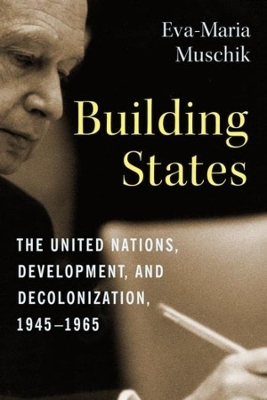
Building States
The United Nations, Development, and Decolonization, 1945–1965
Seiten
2022
Columbia University Press (Verlag)
978-0-231-20025-7 (ISBN)
Columbia University Press (Verlag)
978-0-231-20025-7 (ISBN)
Building States examines how the UN tried to manage the dissolution of European empires in the 1950s and 1960s—and helped transform the practice of international development and the meaning of state sovereignty in the process. Eva-Maria Muschik traces how UN personnel pioneered a new kind of state building in the midst of decolonization.
Postwar multilateral cooperation is often viewed as an attempt to overcome the limitations of the nation-state system. However, in 1945, when the United Nations was founded, large parts of the world were still under imperial control. Building States investigates how the UN tried to manage the dissolution of European empires in the 1950s and 1960s—and helped transform the practice of international development and the meaning of state sovereignty in the process.
Eva-Maria Muschik argues that the UN played a key role in the global proliferation and reinvention of the nation-state in the postwar era, as newly independent states came to rely on international assistance. Drawing on previously untapped primary sources, she traces how UN personnel—usually in close consultation with Western officials—sought to manage decolonization peacefully through international development assistance. Examining initiatives in Libya, Somaliland, Bolivia, the Congo, and New York, Muschik shows how the UN pioneered a new understanding and practice of state building, presented as a technical challenge for international experts rather than a political process. UN officials increasingly took on public-policy functions, despite the organization’s mandate not to interfere in the domestic affairs of its member states. These initiatives, Muschik suggests, had lasting effects on international development practice, peacekeeping, and post-conflict territorial administration.
Casting new light on how international organizations became major players in the governance of developing countries, Building States has significant implications for the histories of decolonization, the Cold War, and international development.
Postwar multilateral cooperation is often viewed as an attempt to overcome the limitations of the nation-state system. However, in 1945, when the United Nations was founded, large parts of the world were still under imperial control. Building States investigates how the UN tried to manage the dissolution of European empires in the 1950s and 1960s—and helped transform the practice of international development and the meaning of state sovereignty in the process.
Eva-Maria Muschik argues that the UN played a key role in the global proliferation and reinvention of the nation-state in the postwar era, as newly independent states came to rely on international assistance. Drawing on previously untapped primary sources, she traces how UN personnel—usually in close consultation with Western officials—sought to manage decolonization peacefully through international development assistance. Examining initiatives in Libya, Somaliland, Bolivia, the Congo, and New York, Muschik shows how the UN pioneered a new understanding and practice of state building, presented as a technical challenge for international experts rather than a political process. UN officials increasingly took on public-policy functions, despite the organization’s mandate not to interfere in the domestic affairs of its member states. These initiatives, Muschik suggests, had lasting effects on international development practice, peacekeeping, and post-conflict territorial administration.
Casting new light on how international organizations became major players in the governance of developing countries, Building States has significant implications for the histories of decolonization, the Cold War, and international development.
Eva-Maria Muschik is a historian and an assistant professor in the Department of Development Studies at the University of Vienna.
Introduction: Managing the World
1. The UN and the Colonial World: International Trusteeship and Non-Self-Governing Territories
2. How to Build a State?: The UN in Libya
3. If Ten Years Suffice for Somaliland . . .
4. Moving Beyond Advice: Pioneering Administrative Assistance in Bolivia
5. Hammarskjöld, Decolonization, and the Proposal for an International Administrative Service
6. State-Building Meets Peacekeeping: UN Civilian Operations in the Congo Crisis, 1960–1964
Epilogue
Acknowledgments
Notes
Bibliography
Index
| Erscheinungsdatum | 14.03.2022 |
|---|---|
| Reihe/Serie | Columbia Studies in International and Global History |
| Zusatzinfo | 20 illus. |
| Verlagsort | New York |
| Sprache | englisch |
| Maße | 152 x 229 mm |
| Themenwelt | Geschichte ► Allgemeine Geschichte ► Zeitgeschichte |
| Sozialwissenschaften ► Politik / Verwaltung ► Europäische / Internationale Politik | |
| ISBN-10 | 0-231-20025-0 / 0231200250 |
| ISBN-13 | 978-0-231-20025-7 / 9780231200257 |
| Zustand | Neuware |
| Haben Sie eine Frage zum Produkt? |
Mehr entdecken
aus dem Bereich
aus dem Bereich
Gewalt, Umwelt, Identität, Methode
Buch | Softcover (2024)
Spector Books OHG (Verlag)
CHF 49,95
wie Freud im Kollektiv verschwand
Buch | Hardcover (2024)
Klett-Cotta (Verlag)
CHF 34,95


